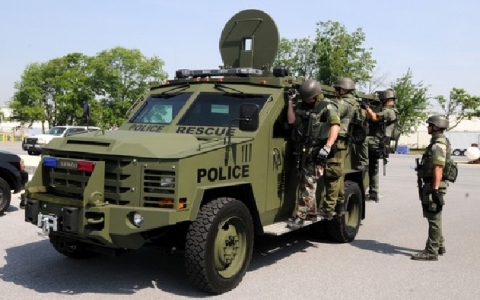There is an excerpt from the book Rise of the Warrior Cop in the July issue of the ABA Journal:
Are cops constitutional?
In a 2001 article for the Seton Hall Constitutional Law Journal, the legal scholar and civil liberties activist Roger Roots posed just that question. Roots, a fairly radical libertarian, believes that the U.S. Constitution doesn’t allow for police as they exist today. At the very least, he argues, police departments, powers and practices today violate the document’s spirit and intent. “Under the criminal justice model known to the framers, professional police officers were unknown,” Roots writes.
The founders and their contemporaries would probably have seen even the early-19th-century police forces as a standing army, and a particularly odious one at that. Just before the American Revolution, it wasn’t the stationing of British troops in the colonies that irked patriots in Boston and Virginia; it was England’s decision to use the troops for everyday law enforcement. This wariness of standing armies was born of experience and a study of history — early American statesmen like Madison, Washington and Adams were well-versed in the history of such armies in Europe, especially in ancient Rome.
If even the earliest attempts at centralized police forces would have alarmed the founders, today’s policing would have terrified them. Today in America SWAT teams violently smash into private homes more than 100 times per day. The vast majority of these raids are to enforce laws against consensual crimes. In many cities, police departments have given up the traditional blue uniforms for “battle dress uniforms” modeled after soldier attire.
Police departments across the country now sport armored personnel carriers designed for use on a battlefield. Some have helicopters, tanks and Humvees. They carry military-grade weapons. Most of this equipment comes from the military itself. Many SWAT teams today are trained by current and former personnel from special forces units like the Navy SEALs or Army Rangers. National Guard helicopters now routinely swoop through rural areas in search of pot plants and, when they find something, send gun-toting troops dressed for battle rappelling down to chop and confiscate the contraband. But it isn’t just drugs. Aggressive, SWAT-style tactics are now used to raid neighborhood poker games, doctors’ offices, bars and restaurants, and head shops — despite the fact that the targets of these raids pose little threat to anyone. This sort of force was once reserved as the last option to defuse a dangerous situation. It’s increasingly used as the first option to apprehend people who aren’t dangerous at all.





